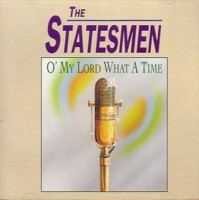

Influences on The King:"How the Statesmen Quartet influenced Elvis"On a regular basis EIN examines a new release or issue in the Elvis world. In this edition we shine our spotlight on: Influences On A Legend #4 – The Statesmen Quartet
The Statesmen Quartet, later known simply as the Statesmen were originally formed in 1948 by Hovie Lister. Apart from Lister, who played piano, and Hess, its other members were Tommy Thompson (bass), Ed Hill (baritone), R D Rozell (tenor) and Budd Bunton (original lead singer). Jerry Hopkins was one of the first to identify the Jake Hess influence. In his biography, 'Elvis', Hopkins included a telling interview with singer and friend of Elvis, Johnny Rivers: "One of his idols when he was young was a man named Jake Hess, who was lead singer for the Statesmen Quartet. If you’ll listen to some of their recordings, you’ll hear some of the style that is now Elvis Presley’s style, especially in his ballad singing style...I think he idolised Jake. Jake and the Statesmen and the Blackwoods." Apart from Johnny Rivers, James Blackwood of the Blackwood Brothers has also been cited as saying Elvis borrowed his ballad/gospel style from Hess. And Joe Esposito, in Good Rockin’ Tonight, comments that Elvis regarded Jake Hess as the finest gospel singer ever. Apart from appeal of the four part harmony exhibited by the Statesmen there is little doubt that Elvis was also drawn to them by the dramatic, powerful vocal style of Jake Hess, even though Hess’s deep bass voice was out of Elvis’s range. Many popular music observers have made the comparison between the Hess and Presley big ballad styles. Charles Wolfe in his essay ‘Presley and the Gospel Tradition’ notes that Hess was adept at using "the background quartet to highlight and even propel his singing" in a way Elvis would later do with the Jordanaires (1956-67), the Imperials (1969-71) and J D Sumner and the Stamps Quartet (1972-77). Interestingly, Hess was a member of the Imperials when they started backing Elvis in 1969, although he would leave the group before they parted company with Elvis in 1971 over a pay dispute. Wolfe perceptively comments that ‘one could almost mistake Hess and the early Statesmen for one of the doo-wop groups of the early years of rock and roll’. He goes on to discuss how origins for the style possibly lay in black gospel music, _where singing with the emphasis on interplay between a lead voice that does the main lyric in front of responding voices is referred to as ‘Dr Watts Style’. Moreover, like other prominent white gospel singers of the time, including J. D. Sumner and Jim Wetherington, Hess’s vocal delivery involved an exaggerated vibrato which was instantly recognizable. He was also noted for distinctively syllabifying the words in a song: "When Ai-eh yam disc-ouraged". J D Sumner agrees that Elvis was particularly interested with the group-lead mechanics. "He remembered how I used to sing and he said he wanted some of those old endings I used to do - some of those 56 endings is what he called them. I used to go Doooooooooo and slur down to a low note." Unlike James Blackwood, Jake Hess was far from conservative. Affectionately referred to as an eccentric he is in fact the virtual opposite to any of the Blackwoods. He would punch out his words, syllable by syllable, and he would play it up with his audience, colouring his notes ‘real dark’. And unlike the more conservative Blackwood Brothers, the Statesmen were known to go all out in a boogie-woogie style that ‘The Killer’, Jerry Lee Lewis would have been proud of. In his gross act of revising the Elvis story, reviled biographer Albert Goldman noted that ‘When the Quartet gets into one of their I-love-you-Jesus vocal valentines, Jake sings with such refinement of tone and dynamics, such startling attacks and swooning melismas, that he virtually reduces the whole house to tears.’ A good example of the similarity in singing style of Elvis and Jake is Elvis’s cover version of the Statesmen song He Knows Just What I Need. Many of Elvis’s other gospel songs, particularly in his live performances, exude the Hess influence. How Great Thou Art is a prime example. And in Elvis’s big ballads, the exaggerated vibrato, power and syllabification of words so much a Hess trademark are very apparent. One only has to listen to Elvis singing You’ve Lost That Lovin’ Feeling and Hurt to realise where he has borrowed from Hess. At Elvis’s funeral Jake Hess and the Statesmen sang Sweet, Sweet Spirit and Known Only To Him. The final comment on the Hess/Statesmen influence should go to Charles Wolfe, on whose essay I have liberally borrowed and to whom I am indebted: "Elvis’s constant concern with using gospel groups as his back-up singers, and insisting that these groups maintain an integrity and identity (as opposed to relegating them to an anonymous studio sound), suggests that he was conscious of their role in the Presley sound." Sources:
This article was prepared by Nigel Patterson and first appeared in ‘Elvis Monthly’ as part of the author’s fourteen part series, Influences On A Legend. ©1998, 2002 Click to comment obn this article
|










